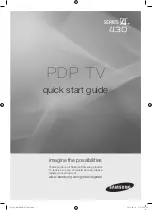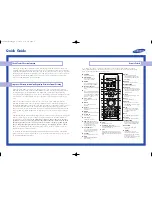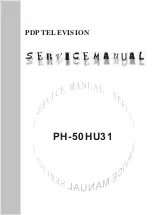
Circuit Descriptions, Abbreviation List, and IC Data Sheets
EN 108
A02U AA
9.
Following blocks are present:
•
Black Stretch (BS). The function of BS is to pull the dark
areas in a picture to even darker levels. BS is available in
both the main and sub channel.
•
Histogram (HMx). This block measures of every field in a
programmable (measurement-) window the histogram of
the luminance signal. The measurement window is set-up
such that the area that contains the subtitles or black bars
does not contribute to the histogram.
•
Black Bar Detection (BBD). Many broadcasts or software
played on TVs produce a so-called "letterboxed" picture.
Black bars appear above and below the picture. Due to bad
standardization of the aspect ratio, e.g. the size of the black
bars, there is a need to actively analyze the picture and
determine of the picture is in letterbox format and what the
size of the black bars is. Black bars are detected by
determining if a defined number of pixels (analyzed within
a programmable window located in active video) are black.
The output of the BBD is the first non-black line and the last
non-black line.
•
Black Level Detection (BLD). The BLD determines within
a programmable (measurement) window the "black level"
of a picture. The BLD will be used for the BS, but if
required, it can also be used for the BBD. The BLD function
records in multiple small windows within the measurement
window the maximum luminance. The minimum luminance
level of the various recorded maximum luminance levels is
the true black level. By measuring the maximum luminance
level in a small window, the BLD is not sensitive to "black"
spikes.
•
Noise Estimation (NEST). The NEST block analyses the
video and outputs a number correlating to the amount of
noise in the picture. A basic problem is that picture detail is
also ‘recognized’ as noise. Several control- and status-
registers are added to compensate this. The video signal is
only analyzed when it is within a programmable
(measurement) window. This window coincides with a
rectangular shaped part of the (visible) picture. Normally
this is the centre part of the picture.
Memory Based Features (MBF)
The Memory Based Features (MBF) block embodies a set of
functions that require (shared) memory.
The main and sub video streams can be spatially compressed
in order to produce a mixed output in the form of several PIP
combinations or DW.
The main video stream can be passed through a temporal
noise reduction circuit (DNR).
The 3D Comb filter is also implemented in this block.
The main and sub streams are merged when reading from
memory. The merged video stream can be up-converted to
either a double line rate (progressive scan) or to a double field
rate (100 Hz). The up-conversion is done by means of a digital
scan function. Following figure shows the functional block
diagram of the video memory based features (MBF).
Figure 9-14 MBF block diagram
Back End Features (BEF)
The Back End Features (BEF) block embodies a collection of
spatial picture enhancement functions.
The video display has to be blanked during AV switching,
channel switching, V-chip, and Child Lock modes. This is done
inside the BEF block of the ADOC IC. The fast blanking signal
input from SCART1and SCART3 (TV SCART inputs) for RGB
video insertion is connected to the ADOC IC.
Sharpness functions are:
•
Luminance Transient Improvement (LTI),
•
Dynamic Peaking, and
•
Digital Color Transient Improvement (DCTI).
The panorama block does the non-linear scaling for displaying
4:3 formats on a wide-screen display.
Color enhancement functions are:
•
Skin Tone Control,
•
Blue Stretch, and
•
Green Enhancement.
A color Space Converter can convert the video signal from
YUV to RGB format. The Frame Processing block can insert
frames and borders such as a colored frame around the Picture
in Picture (PIP). Following figure shows the structure of the
Back End Feature block.
Figure 9-15 BEF block diagram
Digital Output Processor (DOP)
The DOP is a display processor block, and contains the
following functions:
•
RGB control processor with linear RGB input for the main
video signal, a linear RGB input for OSD/text signals with
blending, and an RGB output stage with black current
stabilization which is realized with the continuous cathode
calibration (2-point black current measurement) system.
•
Programmable deflection processor, driven by an
external crystal clock, which generates the drive signals for
the horizontal, east-west, north-south and vertical
deflection with extensive geometry correction capabilities.
•
The circuit can be used in both single scan (50 or 60 Hz)
and double scan (100 or 120 Hz) applications.
Figure 9-16 DOP block diagram
CL 36532058_070.eps
071003
HOR.
COMPRESS
HOR.
COMPRESS
MAIN
CH.
SUB
CH.
VERT.
COMPRESS
SUB
FIFO
CACHE
NOISE
SHAPER
MAIN
FIFO
CACHE
NOISE
SHAPER
DNR
MEMORY
BUS
DEVICE
INTERF.
UNDI-
THER
UNDI-
THER
SCAN
RATE
CONVERT
OUTPUT
MUX.
UNDI-
THER
DISPLAY CONTROL
MODE CONTROL
SDRAM
ADOC MBF
Y
UV
7730
(YUV)
(YUV)
1,14,27
3,9,43,49
VDDE
7300-I
VDD
VDDQ
FIELD MEMORY & TXT PG
MEMORY
CTRL/SWI.
MMI B
U
S
SA0...SA11
SD0...SD15
DTL I/F
7300
CL 36532058_071.eps
071003
SKIN
TONE
CONTROL
BLUE
STRETCH
GREEN
ENHANCE
RGB
MATRIX
FRAME
PROC.
PANO-
RAMA
DCTI
SHARPNESS
MEASURE
LTI
DYN.
PEAKING
F
I
L
T
E
R
LUMINANCE SHARPNESS
COLOUR FEATURES
Y
UV
Y
U
V
U
V
Y
Y
U
V
R
G
B
ADOC BEF
13.5 / 27 MHz
@ 720 ppl
27 / 54 MHz
@ 1440 ppl
B7
TO
7300
CL 36532058_068.eps
071003
Hor. TIMEBASE GEN.
DTO & CONTROL LOOP
SLOW START/STOP
L0W POWER STARTUP
1st
CONTROL
LOOP
SDAC
HIRES.
TIMING
GEN.
HOR. TIMEBASE GEN.
DTO & CONTROL LOOP
SLOW START/STOP
L0W POWER STARTUP
1st
CONTROL
LOOP
SDAC
HIRES.
TIMING
GEN.
ADC
2nd
CONTROL
LOOP
VERT.
WAVEFORM
EAST-WEST
WAVEFORM
VERT.
SAWTOOTH
VERT.
DRIVER
HDROUT
LINE DRIVERS
EHT INFO
POR FLASH
FRAME DRIVE+
FRAME DRIVE -
EW-DRIVE
HFB
EHT
BCL
FBCIN
EWP
VDRP
VDRN
ADOC DOP
HVSYNC
FLASH
X-PROT
BPA
SDAC-VDDA
DOP-DTC-VDDA
DOP-DTC-VDD3
IMEAS-VDDA
SDAC-3V3
B5
SEL2FH











































